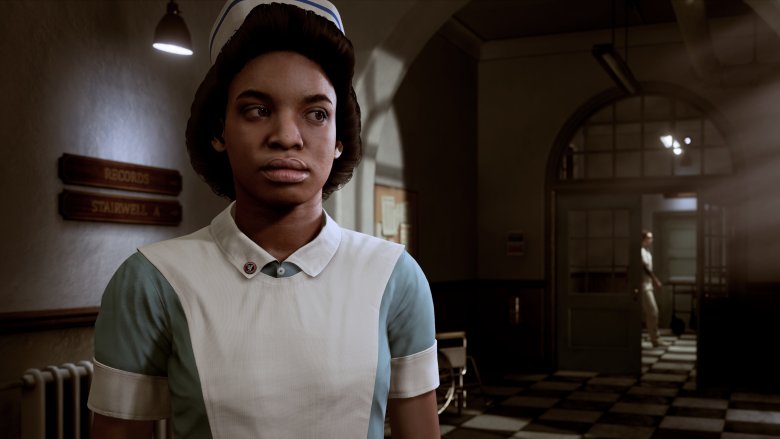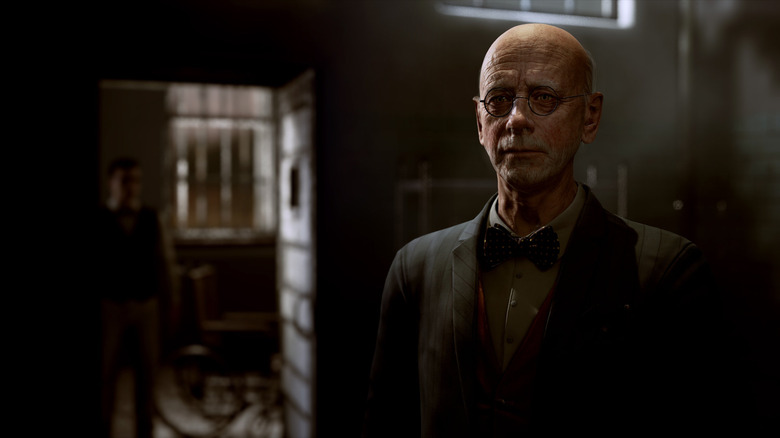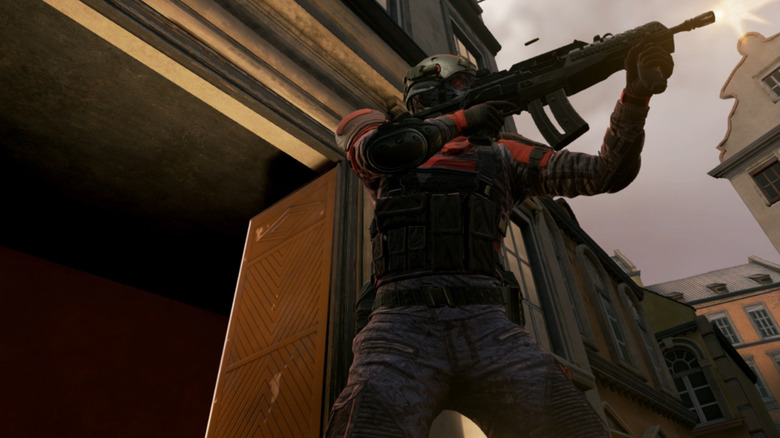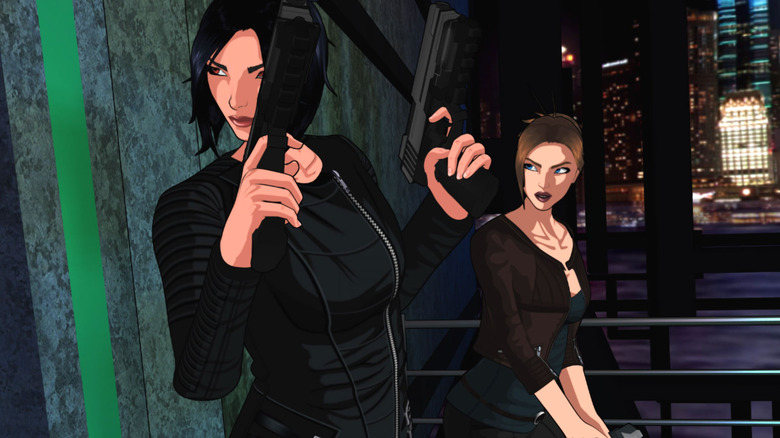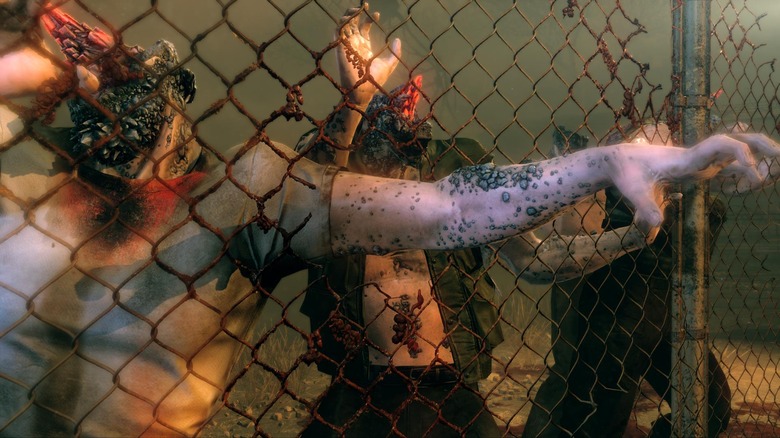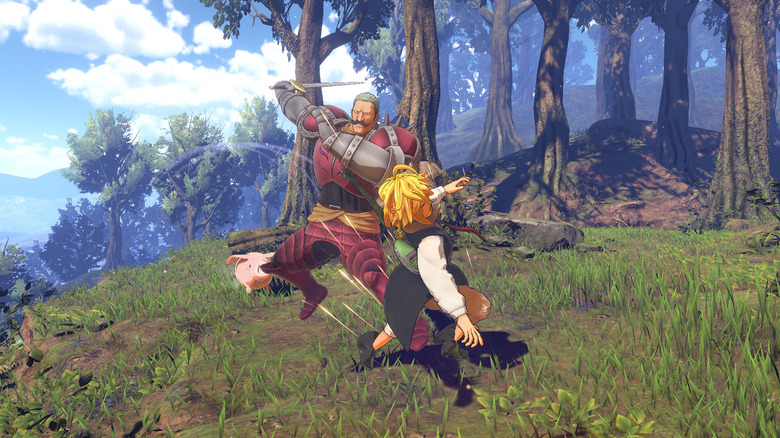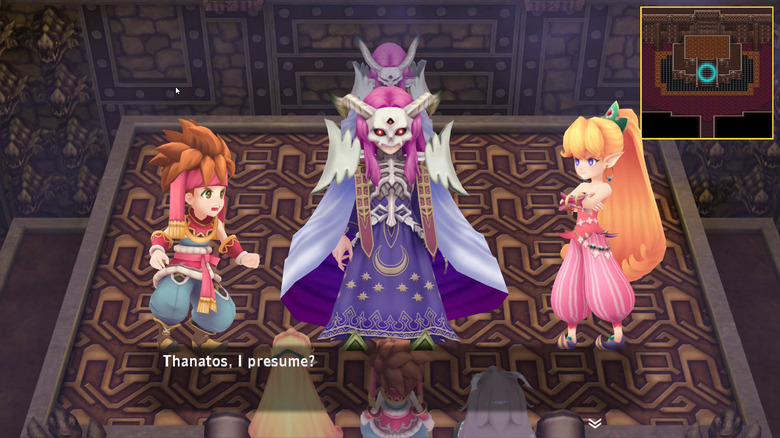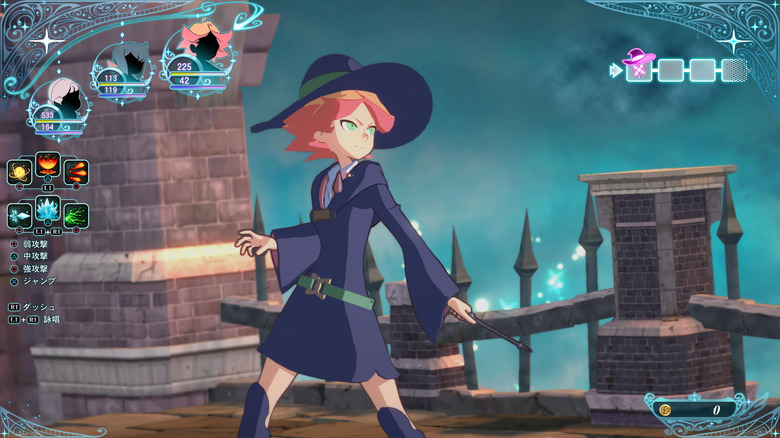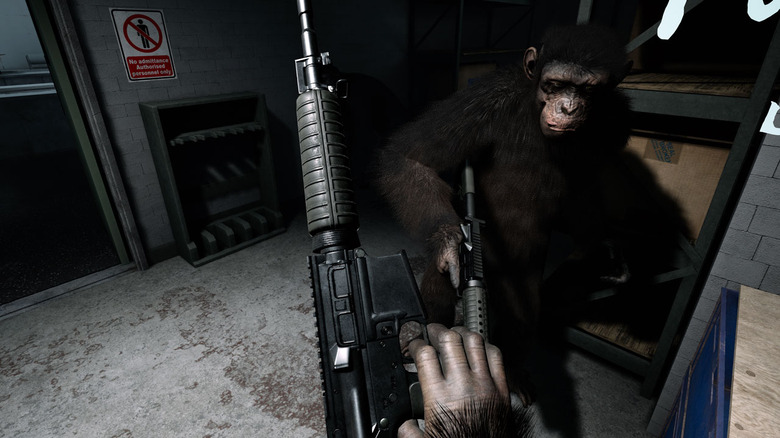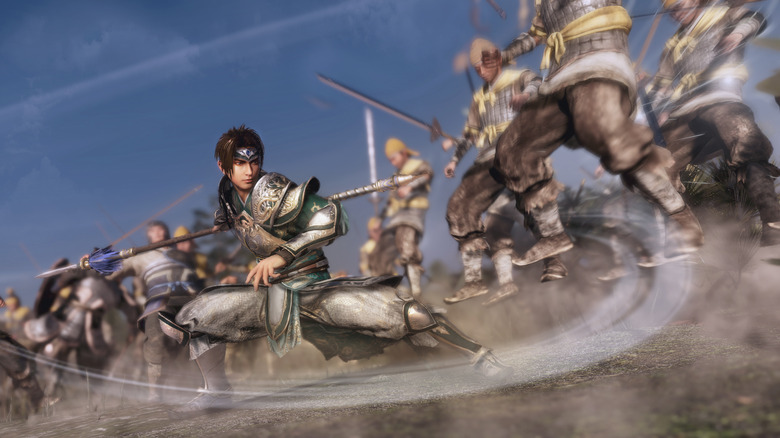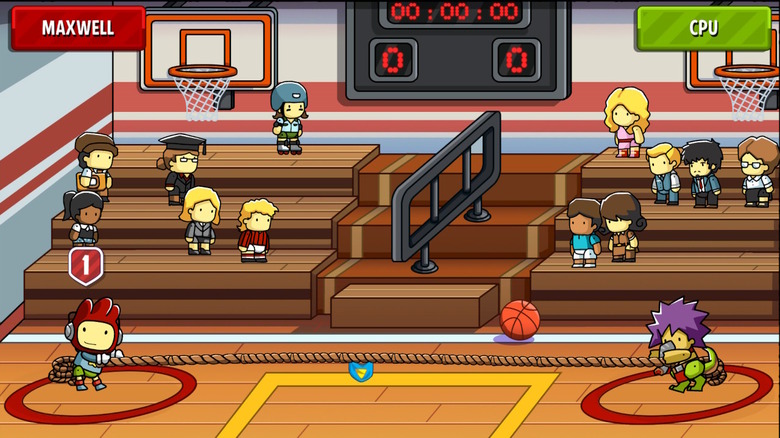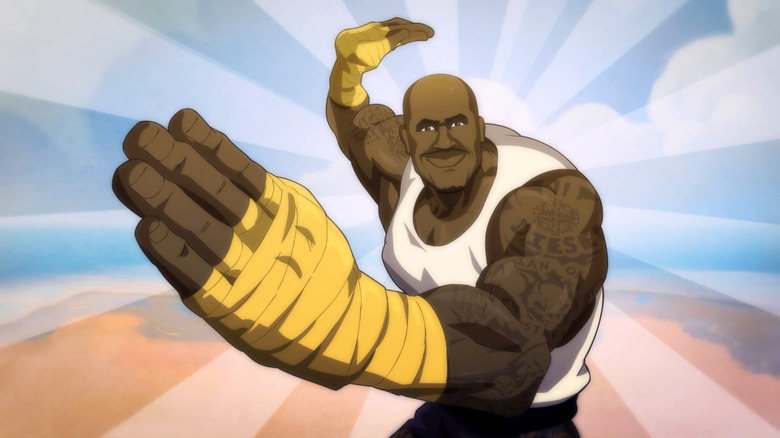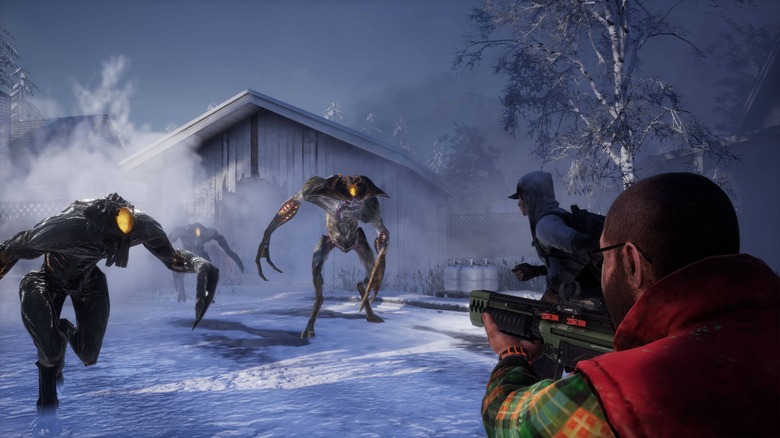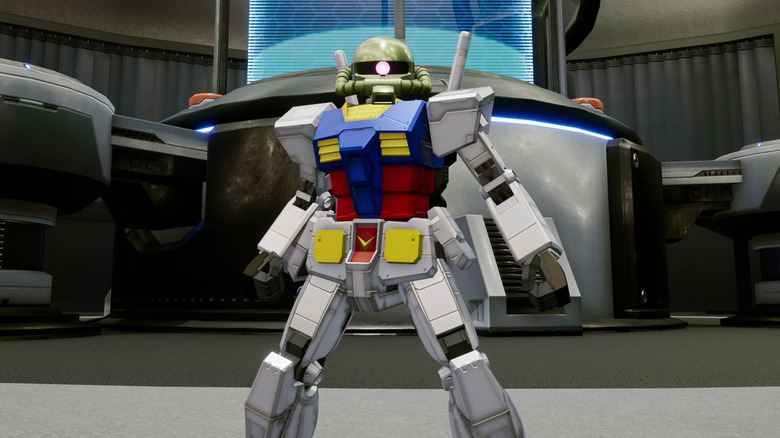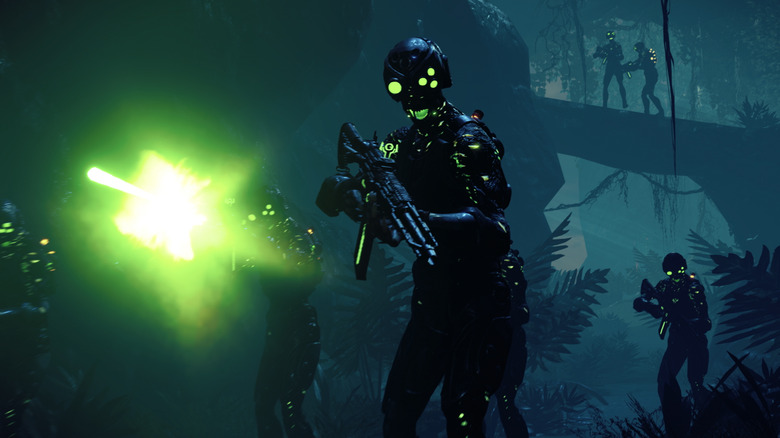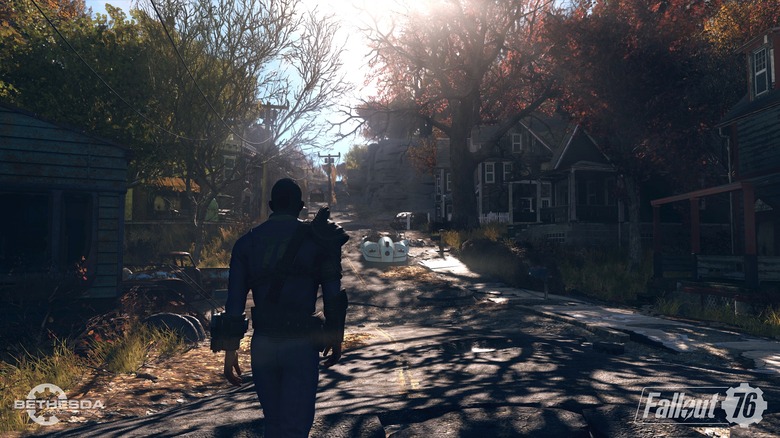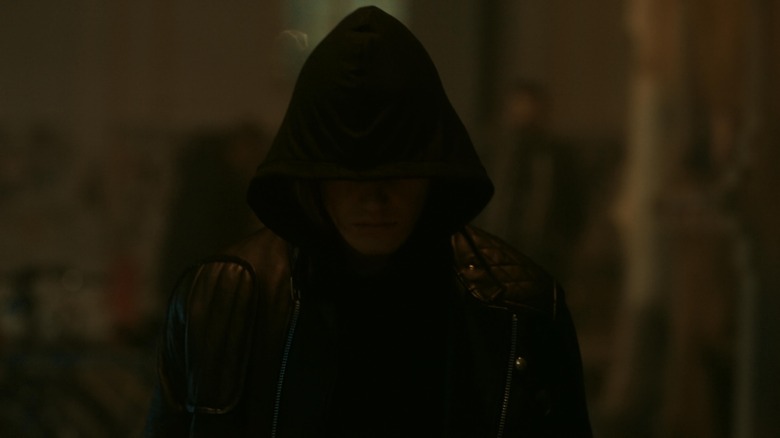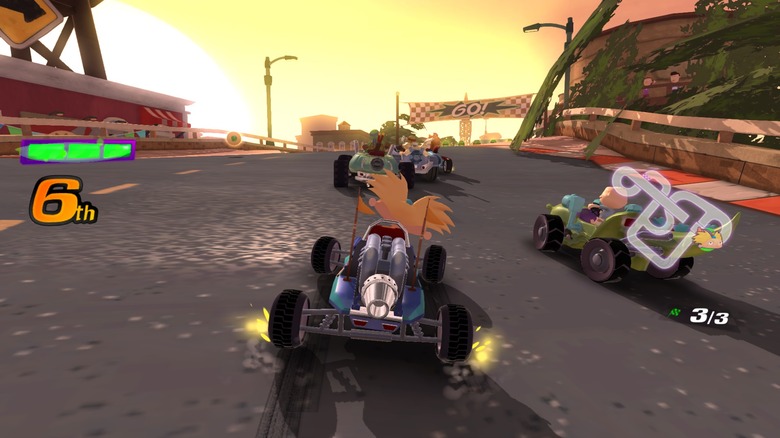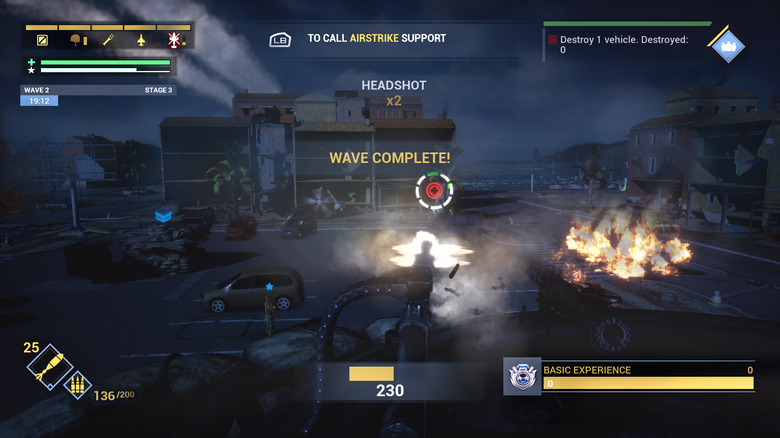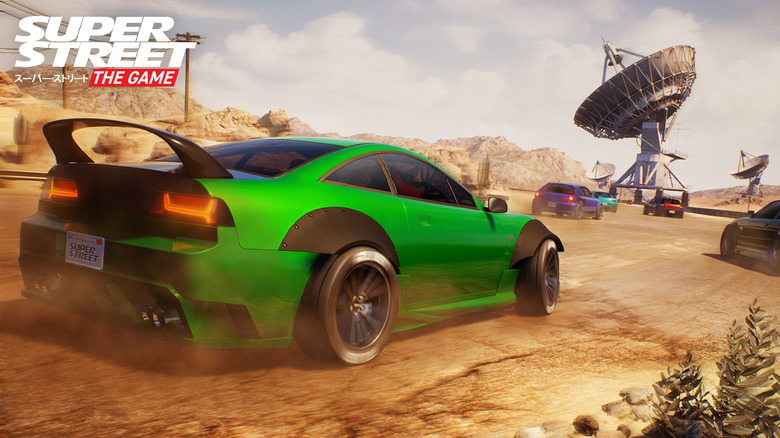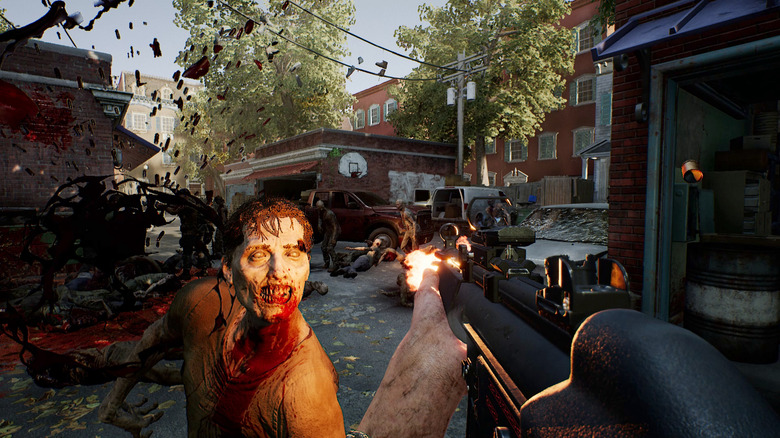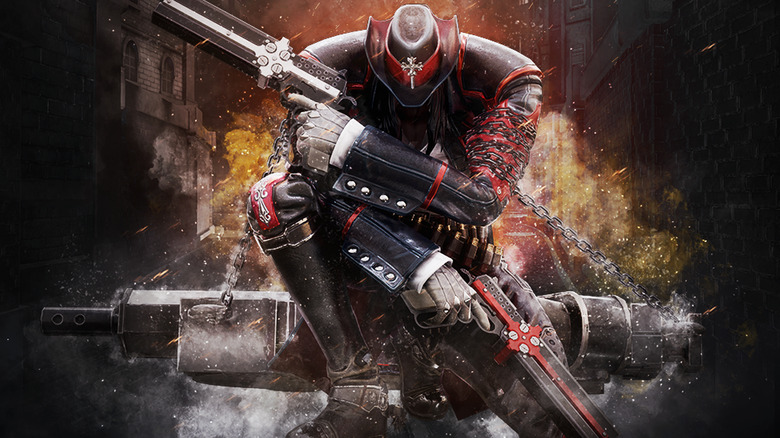The Absolute Worst Games Of 2018
2018 is already shaping up to be a great year for video games. We've had the pleasure of playing triumphs like God of War, which successfully reinvented a classic franchise for a new generation. We've also experienced the wonder that is Celeste, which proves that platformers can indeed have a story, and that even the tiniest teams can still do big things. And there are countless other titles that have made their mark, including Monster Hunter: World, Yakuza 6, and more.
But we're not here to talk about those today. Oh, no. Instead, we're here to talk about the games that failed to deliver. Those that didn't blow us away, but rather, left us disappointed.
We've elected not to dive into the massive amounts of shovelware out there. The games on this list are ones you've likely heard of, as they either come from teams that have done great work in the past, or from franchises that have received mostly favorable reviews. In a year that's already full of fantastic games, the ones we've listed here let us down, and we're calling them out.
These are the worst games of 2018 so far.
The Inpatient checked out
When a game studio has a breakout hit, it's often saddled with huge expectations for its later titles. Maybe those expectations are a bit unfair, but in some cases, they can't be helped. Players become fans, and they develop high hopes for even better games down the line.
That's what happened with Supermassive Games, which came out of nowhere with the stellar Until Dawn. After the studio followed that game with a solid VR release in Until Dawn: Rush of Blood, it looked as though a new game industry darling had been born. But Supermassive soon stumbled. Its next game, 2017's Hidden Agenda, was knocked as a "woeful mismatch of genre and form." And in early 2018, the studio released another dud in the form of The Inpatient.
The Inpatient is a VR title that takes place before the events of Until Dawn, using the sanatorium setting from the first game to tell a story about what occurred there decades before. It shares the branching narrative choices found in Until Dawn, but fails to tell as interesting a story. It also lacks the bloody horror that made the first title such a fright, instead opting for mind games and psychological scares. The Inpatient underwhelmed — and unfortunately for Supermassive, that wouldn't be its first blunder of 2018.
Bravo Team wasn't made by an A-team
Bravo Team was Supermassive's fourth VR title, coming after the little-discussed Tumble VR, Until Dawn: Rush of Blood, and The Inpatient. And it was a departure for the studio, which — aside from the puzzler – had focused on delivering narrative-driven games. Unlike Rush of Blood and The Inpatient, Bravo Team put a gun in your hand and plopped you into a world that felt like an action movie. Could a change in genre — from storytelling to shootouts — help get Supermassive back on the road to greatness? As it turns out, the answer was no.
Bravo Team was a virtual reality shooting game with a terrible camera — something that will kill almost any VR game immediately. On top of that, the game had a disappointingly small arsenal of weapons to choose from and loads of immersion-killing bugs. Eurogamer called it "an astonishingly bad VR shooter from a team that should know better," but based on the company's track record outside of the named Until Dawn games, perhaps Supermassive doesn't know better at all.
Fear Effect Sedna couldn't capture the originals' magic
The Fear Effect series can be traced all the way back to the original PlayStation, where Hana and her crew starred in Fear Effect and Fear Effect 2: Retro Helix. These were games in the Resident Evil vein – action horror titles that also incorporated a variety of puzzles — and both received pretty decent reviews. Fast forward to 2018, though, and we find a completely different Fear Effect title in our midst. One that is not very good.
Fear Effect Sedna throws everything you may have known about Fear Effect out the window. Gone is the 3D, third-person-perspective gameplay. Instead, Fear Effect Sedna tries its hand at becoming a 2D stealth strategy game, and it can't quite pull it off. Along with the change in gametype, Sedna did away with the more tongue-in-cheek storytelling elements, ultimately telling a tale that was as confusing as it was bland. The same crew behind this game — Sushee — is also making a reboot of the first game called Fear Effect Reinvented. Hopefully the studio doesn't try to reinvent too much.
Metal Gear Survive ... didn't
Imagine you have an award-winning game on your hands. How do you take advantage of that and parlay it into more success? Well, for starters, you could use that game's engine to build a new experience. And then you could fire the game's director. Follow that up with stripping the soul out of the story and tacking on zombies for some reason. And then seal the deal by implementing poor survival mechanics that don't let you shoot bad guys nearly as much as you want to.
Wait — not all of those sound like great ideas. But they're the ideas used by Konami in Metal Gear Survive.
You know all about the story of Konami and Hideo Kojima, and you're probably familiar with the near-universal praise poured onto Metal Gear Solid V: The Phantom Pain. But the latest Metal Gear game released by Konami is a shell of its predecessor, a game that exists simply to get more mileage out of the Fox Engine and the Metal Gear name. It manages to downplay a lot of what made The Phantom Pain fun while introducing things the game industry simply has too much of these days: zombies and microtransactions.
We didn't want Metal Gear Survive to be bad. But it is.
The Seven Deadly Sins: Knights of Britannia didn't do its source material justice
The anime genre seems to translate well into video games, at least where graphics and sound are concerned. After all, it's 2D animation, which means developers don't need to worry about creating complex 3D models and effects that tax hardware. What results is something that looks like a playable cartoon — and there's nothing anime fans usually want more.
The Seven Deadly Sins: Knights of Britannia could have been that for The Seven Deadly Sins series. Unfortunately, the team at Natsume, which usually knocks it out of the park with games like Harvest Moon, chose to go in a different direction. The characters and worlds of Knights of Britannia are rendered in 3D, which meant more time was spent building those assets. That time really could have been used for the gameplay, which wound up being super simplistic and boring. Not only that, but the characters don't sync up to the words they're speaking, and that only serves to take players completely out of the experience.
DualShockers, which reviewed Knights of Britannia, said it felt very much like a PlayStation 2 title, despite being released on the PlayStation 4 in 2018. Not exactly a knight in shining armor.
The Secret of Mana remake is no Secret of Mana
Way back in the early '90s, before Square had merged with Enix, an RPG came along that was originally intended to be part of the Final Fantasy series but, instead, launched a whole new series of its own. We're talking about Secret of Mana, a title that eschewed the turn-based battle mechanics of Final Fantasy in favor of a real-time battle system, and is often heralded as one of the best 2D RPGs of all time.
The remake that we got in 2018? Not as good.
Visually, the game doesn't go far enough to recreate the Secret of Mana world in a new and inspired way. Polygon noted that the game's devs "revamped the original 16-bit sprite artwork into middling polygons," which means that the remade Secret of Mana doesn't use the power of its new platforms to do anything remarkable. There are also a host of interface goofs that weren't present in the original but have somehow crept into the remake, including issues with the game's pop-up menu system and a dumbed-down action grid.
Add all the changes together and the new Secret of Mana is somehow a far worse game than the source material it wanted to improve upon. Welcome to the worst games list, Secret of Mana.
Little Witch Academia: Chamber of Time is derivative and dull
To its credit, Little Witch Academia: Chamber of Time tries to do some cool things. The story itself is charming: a girl witch finds herself reliving the last day of witching school over and over, with the game focusing on her quest toward breaking the spell. And the art in the game is beautiful, paying appropriate homage to the anime it's based on. But everything else? It all falls flat.
The game bounces between being a sort of fetch-quest adventure and a dungeon-crawling RPG, and according to Destructoid, "both of these games are awful." There's certainly a whole lot to do in the game thanks to its dozens upon dozens of side quests, but the unfortunate truth is that none of them are fun. Traversing the in-game world is super repetitive, and even when you finally unlock the ability to fast travel, the game hits you up for an in-game currency to unlock travel points and save points. Simply put: there's a lot of grind in this game and not much entertainment.
For a game that looks as whimsical and pretty as Chamber of Time, that's a huge letdown.
Crisis on the Planet of the Apes VR shouldn't be played by humans
The newer Planet of the Apes movies are pretty great, and if you're a fan, the prospect of playing a virtual reality experience in that world might sound tough to turn down. After all, the sky is the limit when it comes to the kind of story that game could tell. But it's here that we break the bad news to you: Crisis on the Planet of the Apes VR is the gaming equivalent of the the 2001 film that starred Mark Wahlberg (i.e., terrible), and you don't get to play as a human in a world surrounded by increasingly intelligent apes. Instead, you're one of the apes. And the controls make you look stupid.
You start out as a chimp trying to escape a detention facility. You're supposed to be wicked smart, but as IGN puts it, "A random observer watching you struggle clumsily to pick up objects or walk forward would assume you're nothing more than a regular monkey, and possibly a drunk one." This is due to the poor controls contained within the game, and in a medium that is all about immersion (VR), feeling like you lack the expected agency over your character immediately pulls you out of it.
Crisis doesn't get better past the opening moments, which puts the game itself in a crisis. It fails to do the bare minimum to be a decent VR game.
Dynasty Warriors 9 is open-world for no reason
There have been a whole lot of Dynasty Warriors games, including nine in the main series and countless other spinoffs. But Dynasty Warriors 9 is the first in the mainline collection to try something completely different. It does away with the typical "run here, fight people" mission framework and, instead, opens up the world for players to explore. Unfortunately, all that openness doesn't necessarily make for a better experience.
Dynasty Warriors 9 doesn't keep players on a rail like it used to, but the world it now lets players roam freely isn't all that exciting. It isn't brimming with interesting things to do, and there's no real reason for players to go off the beaten path. Sure, you can go off and collect items for crafting, but as IGN noted, "The entire game is perfectly beatable without ever touching the crafting system, other than making healing items every now and then." What then, is the point?
There isn't much of one. The open-world additions don't offer anything compelling, so Dynasty Warriors 9 feels a whole lot like every other Dynasty Warriors game, but more boring.
Scribblenauts Showdown didn't go down well
The first Scribblenauts title arrived on the Nintendo DS all the way back in 2009. Since then, we've seen five more entries into the franchise, including the one we're here to talk about today: Scribblenauts Showdown. The first game, along with the four that followed it, received generally good reviews. So what in the world happened to Showdown?
It's worth noting that Showdown is the first game in the Scribblenauts series in nearly five years, and was not developed by the team at 5th Cell (which had handled every title before) but, instead, by Shiver Entertainment. And it's a vastly different game than those that came before. Showdown trades in the word-fueled creative fun of the previous installments for a party game setup, and many of these games are all about tapping and moving things quickly. Most have little to do with words at all. It's a bummer for those who found educational value in the earlier titles, and a pretty unnecessary change to a series that already had a unique twist.
Hopefully the next Scribblenauts game goes back to its roots. Until then, Showdown will go down as a weak point in the series.
Shaq Fu: A Legend Reborn was dead on arrival
The original Shaq Fu is generally accepted to be a bad game, in spite of the fact that it received pretty mixed reviews at its release. GamePro said, "Shaq gets shrunk down to size, but his Shaq Fu stands tall," while a reviewer at EGM stated, "...it's got some decent moves and a story mode, but it doesn't have the technique."
Reviews are, of course, opinions shared by those who've played through a game. So it shouldn't be too surprising that the opinions on Shaq's first foray into the fighting genre vary. But now Shaq stars in a second fighting game, and the opinions on this one are largely uniform: it sucks.
The combat in Shaq Fu: A Legend Reborn is boring. The story mode makes absolutely no sense. And the game is severely lacking in modes, including co-op. Destructoid called it "a nostalgic joke taken too far," and Eurogamer Italy said, "It really fails to impress, due to dull and repetitive mechanics and a total lack of depth." Those are fairly unkind words for a game that fans hoped would finally give Shaq the fighting game he deserved.
Those fans donated nearly $460,000 to Shaq Fu: A Legend Reborn's Indiegogo campaign. And what did they get in return? A corpse of a game.
Earthfall was universally panned
There is a metric crap-ton of zombie games these days. You have the various entries in The Walking Dead franchise, along with the State of Decay series, Dead Rising, Dying Light, DayZ, and more. And that's not even counting the incredibly popular Zombies Mode in the Call of Duty games. It really feels like we're nearing peak zombie (if we're not already there), which is what made Earthfall's premise so interesting.
Earthfall aims to put an extraterrestrial spin on the State of Decay co-op formula. But instead of holing up and building up defenses against a zombie horde, you're battling back against invading aliens using a variety of high-tech weapons. It's just different enough to feel refreshing — at least, that was the goal.
The reality? Earthfall is lame.
Game Informer said the weapons in the game "all look generic and lack a satisfying punch." The Sixth Axis elaborated on the game's console performance, stating that, especially on the PlayStation 4, "you'll have to cope with a frame rate that struggles to keep up." And PlayStation Universe said that "Earthfall feels like a cheap imitation of a great game." Most scores for the title wound up in the 2-5 out of 10 range — not a great place for a video game to live.
You'll probably want to avoid this one.
New Gundam Breaker is a broken mess
Imagine if the Halo series spun off a new game that focused on you building and battling with a toy Master Chief. It would be pretty weird, right? Well, that's essentially the premise behind the Gundam Breaker series of games, along with its newest entry, New Gundam Breaker. It's not a Gundam game in the proper sense. Rather, it's a sort of school simulator that also includes time for one very important hobby: putting together your own model Gundam, and then using it to battle the Gundams of other students in VR.
Now, that approach doesn't automatically make the game bad, and you'll undoubtedly find fans of past games in the series. But there are a whole lot of problems with New Gundam Breaker. Reviews of the game have called out the game for its awful controls and sub-par framerate, as well as a story campaign that doesn't offer a lot in the way of excitement.
Those aren't opinions that inspire a whole lot of confidence, and unsurprisingly, the game sits at a Metacritic score of 43 among professional critics, and a miserable score of 2.8 among users. It's probably best you avoid this one.
Immortal: Unchained is 'Dark Souls with guns' ... minus the fun
Back when media outlets were getting their first looks at Immortal: Unchained, the game looked to have a lot of promise. The developer, Toadman Interactive, had a track record of contributing to pretty big projects, including Warhammer: Vermintide and Dead Island 2. And those who played early versions of the title had good things to say, with one writer praising its "gritty art style" and "unforgiving approach to gameplay."
The final reviews for Immortal: Unchained, however, told a different tale. Many of them called the game "Dark Souls with guns." The difference, though: Dark Souls is actually good.
Push Square, for example, called the game out for its "unacceptable technical flaws" and unoriginal combat. Trusted Reviews also took issue with the game's clunky controls, stating that most put up with the flaws inside Dark Souls because of its standout combat, but the fights inside Immortal: Unchained are a "mediocre exercise in frustration." And at the time of this writing, the game's Metacritic reviews page does not have a single critic review in the "positive" category, which means the reviewers above weren't alone in their feelings about the game.
If you're on the hunt for a good Souls-like with guns, sadly, this one isn't it. You're better off avoiding Immortal: Unchained entirely.
Fallout 76
We're just as surprised as you are to see a Bethesda game on this list. Bethesda is home to so many great properties, such as the Elder Scrolls games, Fallout, Dishonored, Doom, Wolfenstein, and Prey. And usually, you can count on Bethesda to deliver when a new game comes out. They aren't always perfect 10/10 gems, but they're never bad.
Well, the streak had to end sometime. After decades of pumping out awesome stuff, Bethesda released Fallout 76. And it is a bad game.
Fans were highly skeptical when Bethesda announced an online multiplayer Fallout game at E3 2018. As it turns out, that skepticism was warranted. Fallout 76 doesn't contain a whole lot of what people like about the Fallout series, which makes Bethesda's patented game engine jank harder to overlook. And most critics took the game to task as a result. IGN said it tries to "do everything" and "fails to do any of it well enough to form an identity." And GameSpot was even harder on Fallout 76, calling its world "an inconsequential wasteland doomed to be nuked over and over again."
It feels strange to say it, but it's probably best that you avoid this latest Fallout game. It's Fallout in name only, and it's not worth your time or your money.
The Quiet Man
Square Enix is a tough company to get a handle on. It'll put out great games like Shadow of the Tomb Raider and complain about poor sales. And then it'll sign off on a game like The Quiet Man, which just might be the worst game released in the year 2018.
GameSpot's review of The Quiet Man can be summed up in this short phrase: "inexplicable design." When you see those words attached to a game review, you know a game is bad.
The Quiet Man is a sort of interactive movie. It mixes live-action film scenes with 3D action. And it fails to do either of those things well. The main character is deaf, and in order to better immerse you in his world, the game itself is almost entirely silent. That's a neat premise. The problem is, significant story beats appear to be happening during the game's cutscenes and you can't hear them. The game doesn't even use subtitles! It's truly stunning that anyone thought this was a good idea. Again, "inexplicable design."
And when the game stops being a movie and starts being a video game, things don't get any better. The Quiet Man uses rudimentary beat-em-up mechanics. And those are pretty much the only mechanics you encounter during the game. The combat is boring. Actually, everything is boring. All of The Quiet Man is boring and bad.
It's safe to say that you should stay away from this one at all costs.
Nickelodeon Kart Racers
The mascot racing genre is a surprisingly crowded space. There is the Mario Kart series, of course, which really helped get the trend started. And there are the Sonic All-Stars games, which feature Sonic and all of his pals on the Sega side of things. And now we have Nickelodeon Kart Racers, which fans of SpongeBob and the Teenage Mutant Ninja Turtles wanted so badly to succeed.
It didn't. You might think it's hard to screw up a kart racing game, but Nickelodeon Kart Racers manages to do it. And it does it a lot.
Where to begin? Push Square calls Nickelodeon Kart Racers a "shallow racing game that underwhelms at every turn." And they're not off base in saying that. If you squinted your eyes and started a race, you might have no idea you were playing a video game featuring some of Nickelodeon's biggest properties. The tracks aren't all that themed to the shows. There isn't any voice work to speak of. It all just feels like someone threw together some 3D models of Nickelodeon characters and rushed a bad racing game out the door. It looks more like a sleazy attempt at separating you from your money than it does a fan-service racing game.
Do yourself a favor: pass on this one.
Heavy Fire: Red Shadow
When larger game outlets don't review a game, it's usually not a great sign. Sure, maybe they're busy. Maybe there are so many games coming out that they can't keep up. But you can also take it to mean this: they already know the game is going to be bad, and they think you'll be able to tell, too. Just by looking at it.
Such is the story of Heavy Fire: Red Shadow, which unfortunately, sucks.
If you've ever laid eyes on a Heavy Fire game before, you probably knew this one was going to be bad. They all are. The Heavy Fire series has been dwelling in the Metacritic basement since Heavy Fire: Afghanistan dropped in October 2011. Yet someone keeps making them. And this time, they managed to work PlayStation VR support into the game, because playing a boring wave-based shooter is apparently more fun if you feel like you're bored in that actual place.
The game looks way worse in VR. And it already doesn't look that great.
Gaming Age ended its review by saying that "Heavy Fire: Red Shadow is just not good." And that was one of the kinder reviews. Don't let this one anywhere near your PlayStation.
Super Street: The Game
Here's a lesson all backseat game developers should take to heart: having opinions about a thing doesn't automatically make you good at it. It's why every newspaper sports writer isn't putting on a helmet on Sundays. It's why every food critic isn't a world-renowned chef. Heck, it's why we aren't subjecting to you article after article about our own poorly made video games.
The folks at Motor Trend should have kept this lesson in mind. They create a lot of content about cars. And somewhere along the way, they decided it would be a great idea if they made a racing game. Surely, with all of that automobile expertise, they could help produce one of the greatest racing titles ever, right?
Wrong. Way wrong. Super Street: The Game might be a worse racing game than Nickelodeon Kart Racers. Seriously.
To start, Super Street doesn't try to be a sim racer, which is baffling. Instead, it goes for over-the-top arcade action. And it fails miserably. The driving is bad. The destruction in the game seems to happen at random. And the AI opponents you race against can apparently defy the laws of physics in every single contest. There's very little good to say about Super Street, and that should say it all.
True Achievements calls Super Street "borderline irredeemable." We agree. Race away from this one as quickly as possible.
Overkill's The Walking Dead
Fans of The Walking Dead have been treated pretty well in the video game space. Telltale — rest in peace — gave us narratives that were nearly as moving as the source material with its original Walking Dead title and some of its later seasons. It wasn't unreasonable, then, to have high hopes for Overkill's The Walking Dead, a first-person cooperative shooter from Starbreeze Studios, which had worked on Payday 2 and The Chronicles of Riddick: Escape from Butcher Bay.
Guns. Zombies. Working as a team. A studio with a pedigree in shooters. That sounds exactly like the type of game that would fit perfectly with the Walking Dead license, right?
As it turns out, no. Overkill's The Walking Dead was a disaster of a game. The game reviewed poorly, with IGN calling it out for "technical issues, unavoidable repetition, and a general lack of direction." And that's not all. The game's poor performance left Starbreeze in dire straits, and on top of that, the studio's offices in Sweden were raided by authorities on suspicion of insider trading.
Players were just hoping to kill some zombies in a fun new Walking Dead game. Instead, the new Walking Dead game might have killed the studio that created it.
Gungrave VR
The original Gungrave first appeared on the PlayStation 2 all the way back in 2002. The reviews were so-so even then, and nearly 16 years later, it didn't seem like anyone was clamoring for another entry in the franchise. But that didn't stop developer Red Entertainment from giving it another go. And hey — why not try it in VR this time?
So we got Gungrave VR, a resurrection of a long-dormant game series that actually serves as a prequel to another in-development Gungrave title. And if Gungrave VR is any indication, Gungrave G.O.R.E. will be just as bad when it finally comes out.
Destructoid hit Gungrave VR with a 5/10 score, knocking it for its lack of a story, in addition to calling it "rigid and not particularly welcoming." That's a pretty unforgivable sin in a regular video game, but in virtual reality — where you're really immersed in a game — the world has to grab you and the controls have to feel on point.
Maybe Gungrave G.O.R.E. will surprise us and reach the potential that the Gungrave series has had since the first launched near the turn of the century. But Gungrave VR just isn't worth the time it'll take to strap your VR headset on, never mind your money.

